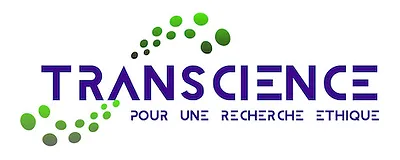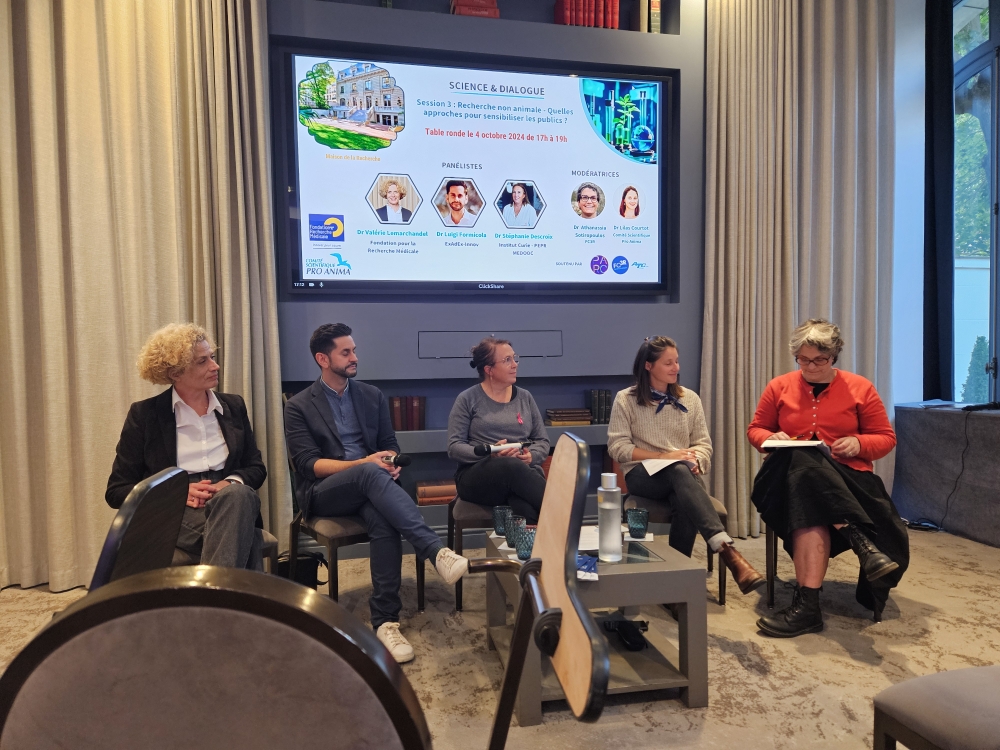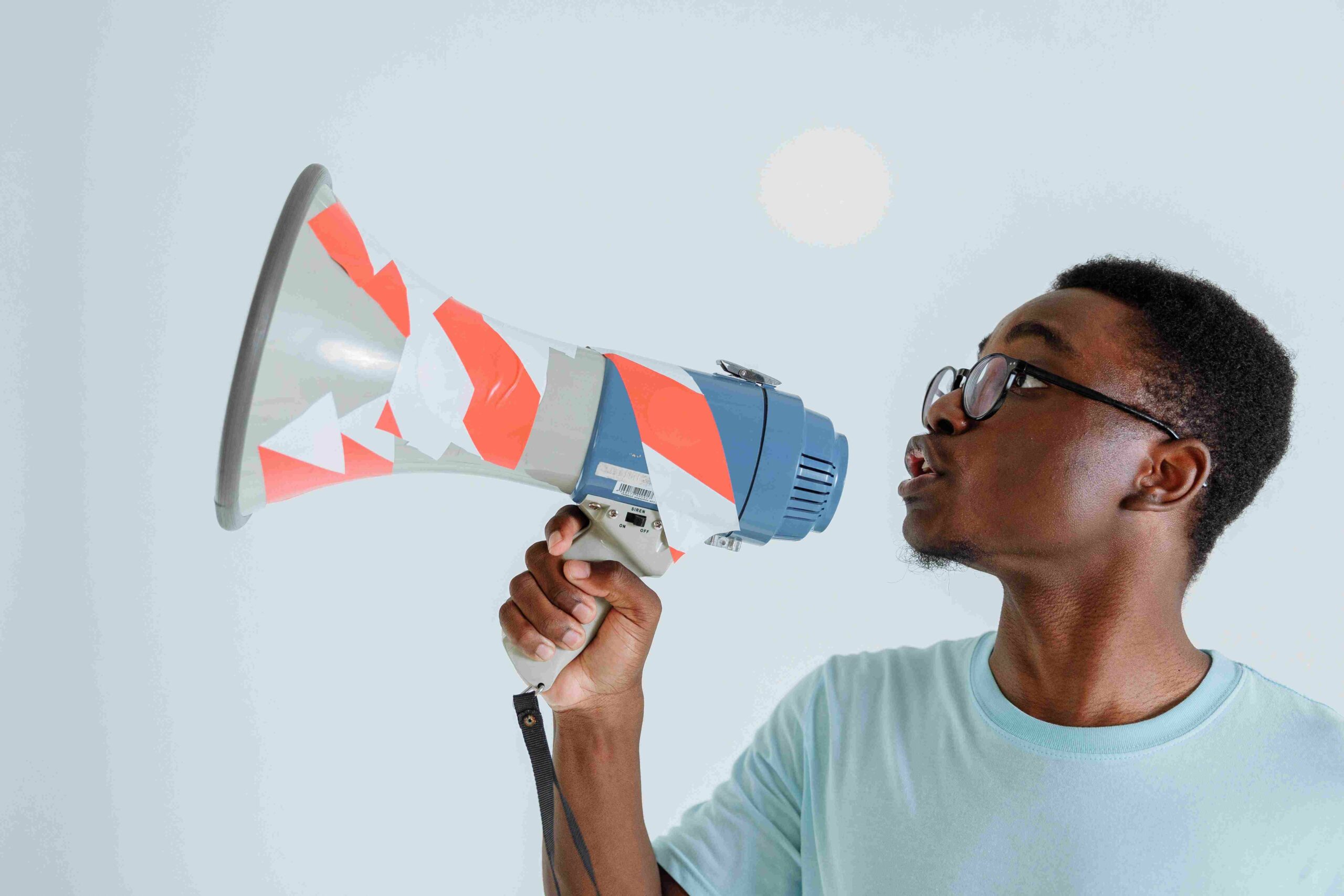October 4, 2024, Paris, “Sciences et dialogue” round table organized by the Pro anima scientific committee at the “Fondation pour la Recherche Médicale“
In 2024, the Pro anima scientific committee launched a series of regular meetings between researchers developing non-animal methods, industrialists and regulators: “Science and Dialogue”.
These meetings take the form of round tables and aim to :
- contribute to greater acceptance of New Non-Animal Methodological Approaches (NAMs) in toxicological and regulatory testing,
- foster cross-functional dialogue between the various operators in the fields of research, industry and regulation,
- identify current and future scientific and regulatory obstacles and levers,
- create content to inform and raise awareness among the general public about advances in the field of NAMs.
On October 4, 2024, the third round table entitled “Non-animal research, what approaches for raising public awareness?” was held at the Fondation pour la Recherche Médicale (FRM) in Paris.
Muriel Obriet, President of Transcience, was present in the audience.
The debate was co-hosted by Athanassia Sotiropoulos, Director of FC3R, and Lilas Courtot, Scientific Director of Pro anima.
Panelists included :

Dr Valérie Lemarchandel
Valérie Lemarchandel holds a doctorate in biology and is a research director at the CNRS. Between 1989 and 2006, she worked in the fields of hematology, embryonic development and molecular genetics. She then spent 4 years in charge of scientific communication at the CNRS Institute of Biological Sciences.
Since 2010, she has been Scientific Director of the Fondation pour la recherche médicale and a member of its Board of Directors.

Dr Stéphanie Descroix
Stéphanie Descroix is currently Director of Research at the CNRS, head of the Macromolecules and Microsystems in Biology and Medicine research team at the Institut Curie Paris and the Institut Pierre Gilles De Gennes. Her team is world-renowned for the development of micro-fluidic (organ-on-a-chip) devices and concepts for fundamental biology, biophysics and the clinic, with a strong commitment to technology transfer in medicine and the life sciences. She is deputy director of the French national network on micro-fluidics (GDR MNF). She is the author of over 90 scientific publications and has participated in several highly selective European projects. In 2016, she successfully co-launched the micro-fluidics-based company Inorevia, which has received awards from several prestigious French and European institutions. More recently, Stéphanie distinguished herself for her contribution to the project MED-OOC (Organs and organoids on microchips), supported by CNRS, Inserm and CEA, which aims to develop a new generation of organs and organoids on microchips, capable of mimicking the physiology or pathology of the patient’s organ, with the objective of using it for personalized medicine.

Dr Luigi Formicola
Luigi Formicola is the co-founder and COO of ExAdEx-Innov, an innovative startup that aims to revolutionize adipose tissue research with patented ex vivo models that faithfully reproduce human fat.
With a PhD in cell biology, he has over ten years’ experience in research project management and technology transfer in the biotech sector, as well as in drug development. He has witnessed developments in preclinical research and the emergence of alternative solutions designed to reduce the need for animal experimentation while improving the predictability of clinical trials.
(Source: Pro Anima website)
Discussions focused on :
- The terminology used in the field of New Methodological Approaches (NMAs) leaves room for diverse interpretation in the scientific community and is too complex for the general public,
- The ethical challenges of animal experimentation and the relevance of non-animal models,
- Scientific education of the general public – including new non-animal research methods – is necessary to enable a better understanding of scientific and technological advances,
- The involvement of audiences, who need to be reached “where they are”, and the difficulty of popularizing science, which has to simplify concepts without losing their essence,
- The role of the media, who have little expertise in science and research and who – all too often – oversell scientific advances to meet the expectations or beliefs of the public,
- Identifying the audiences you want to reach, so as to identify the right channels (including social networks) to inform them,
- The example of communication and education in the project MEDOoc (project French development of organoids on a chip),
- The role of the private sector, whose communication is primarily motivated by commercial interests, but which could also be part of a corporate social responsibility (CSR) approach focused on transparency,
- The role of public decision-makers, who are often lacking in scientific culture and with whom a dialogue needs to be established,
- Prospects for new non-animal methods, with encouraging initiatives both in France and abroad.
It emerged from this round table that the specific issues linked to non-animal methods are part of a more global challenge concerning the popularization of science and science education for all audiences.
The meeting provided an opportunity to raise and discuss various avenues for raising society’s awareness of research and NAMs. However, participants agreed that the discussion could have been extended, as the subject is so vast.
We recommend that you read the full report of this round table, written by the Pro Anima committee, here:




